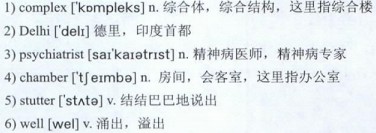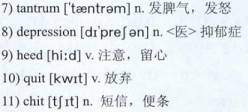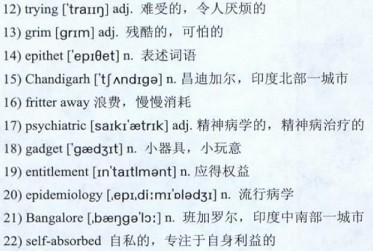文字难度:★★★☆
Deep inside the U-shaped 1)complex of 2)Delhi’s All India Institute of Medical Sciences (AIIMS), the clock clacks against the heavy silence in 3)psychiatrist Manju Mehta’s 4)chamber. A mother sits huddled in front of her. “I want to say sorry for not listening to you,” she 5)stutters as she talks, her eyes 6)welling with tears. Neither she nor her husband had accepted Mehta’s diagnosis that behind her son’s falling grades and temper 7)tantrums lay a learning disability and severe 8)depression. “Conduct disorder is his way of gaining self-respect,” Mehta had told them. The parents, more interested in improving his school performance, had not 9)heeded the advice, “Don’t put pressure on him.” Just before the annual exams, he had suddenly turned over a new leaf: he was nice to everyone, listened to everything his parents said, met up with people he was fond of. Finally, one afternoon, he took his own life. “I 10)quit,” read the 11)chit lying on his bed.
精神病专家曼如·梅塔的办公室位于德里市全印度医学科学院一栋U形综合大楼的最里面,墙上的挂钟滴答作响,反衬出室内令人压抑的沉默。一名母亲蜷坐在梅塔对面。“我真后悔,没有听您的劝告,”她断断续续地说,眼里充满泪水。之前,无论是她还是她丈夫都无法接受梅塔的诊断结 果——他们的儿子之所以成绩下降,暴躁易怒,是因为患上了严重的抑郁症和有学习障碍。“行为失常是他获取自尊的一种方式,”当时梅塔告诉他们。但是,她和她的丈夫更关心如何才能提高孩子的学习成绩,而没把梅塔的忠告——“不要对他施加压力”——放在心上。在期末大考到来前夕,孩子突然发生了转变,想要重新开始:他对每个人都很友好,对父母说的每句话都洗耳恭听,和他喜欢的人聚会。然后,一天下午,他自杀了。“我放弃了”,他留在床上的一封短信里写道。
 Being a teenager has never been easy. But in the new millennium, amidst unprecedented prosperity, growing up seems to have become more 12)trying than ever for Indian teens. The 13)grim 14)epithet to their tormented lives is the suicide note. Sometimes they express an inability to cope with pressure, as in the case of a Delhi student who hanged himself from a ceiling fan by his mother’s sari. “Goodbye,” he wrote. “I can’t take the pressure any longer. I love my family and I hope they will understand.” Ever so often there is helplessness: “I am not doing well in exams,” wrote a girl from15)Chandigarh to her parents before she took her life, “I can’t even manage my own affairs. I’ve 16)frittered away my college fees on trivia. No one’s responsible for my death.”
Being a teenager has never been easy. But in the new millennium, amidst unprecedented prosperity, growing up seems to have become more 12)trying than ever for Indian teens. The 13)grim 14)epithet to their tormented lives is the suicide note. Sometimes they express an inability to cope with pressure, as in the case of a Delhi student who hanged himself from a ceiling fan by his mother’s sari. “Goodbye,” he wrote. “I can’t take the pressure any longer. I love my family and I hope they will understand.” Ever so often there is helplessness: “I am not doing well in exams,” wrote a girl from15)Chandigarh to her parents before she took her life, “I can’t even manage my own affairs. I’ve 16)frittered away my college fees on trivia. No one’s responsible for my death.”
对一个十几岁的少年来说,生活决非易事。随着新世纪的到来,印度正大步迈向前所未有的繁荣,而与此同时,对印度的青少年而言,成长似乎也变得更加令人“难受”。 那一纸“自杀遗言”便是对他们苦恼人生的残酷概括。有时候他们表示自己无法应对沉重的压力,比如一名来自德里的学生,他用母亲的纱丽缠在吊扇上自缢身亡。“永别了,”他写道,“我再也无法忍受那些压力了。我爱我的家人,希望他们能够理解我。”更多的人在遗书中表现出一种无助感:“我考试成绩一直不好”,来自印度北部城市昌迪加尔的一个女孩在自杀前写给父母的信中说道,“我连自己份内的事都做不好,我的大学学费都浪费在无关紧要的琐事上面了。没有人需要对我的死负责。”
In India, as many as 12.8 percent of adolescents now suffer from 17)psychiatric disorders, says the Indian Council of Medical Research. But what explains the high-levels of depression? By every measure, urban children have much more—clothes, toys, 18)gadgets—than their parents, who were raised on post-Independence values of thrift and self-sacrifice, ever did. It’s a problem of plenty, say psychologists. Recent studies show that children who have been given too much too soon grow up to be adults who have difficulty coping with life’s disappointments.
印度医学研究委员会表示,在印度,多达12.8%的青少年罹患精神疾病。可是,抑郁症如此高发,原因何在呢?不管从哪个方面来讲,与在印度独立后成长起来的、深受勤俭节约的价值观和自我牺牲精神熏陶的父母辈相比,印度城市里的孩子的物质生活都丰富得多,从衣服、玩具到各种小玩意,应有尽有。心理学家说,这是富足引发的问题。近来的研究表明,那些在童年时代被给予太多且提出要求总是能迅速得到满足的孩子长大成人后,面对生活中的挫折会手足无措。
“They have a distorted sense of 19)entitlement that gets in the way of success both in the workplace and in relationships,” says Dr. Gururaj, head of the department of 20)epidemiology at the National Institute of Mental Health (NIMHANS) in21)Bangalore. “They often grow up to be self-centred and 22)self-absorbed, and those are mental-health risks.” A suicide survey which he conducted in 2004 found that 57 percent of youth suicides were sudden acts of frustration.
“他们有一种自以为理应获得厚待的扭曲心态,无论是在工作上,还是在人际关系方面,这都会阻碍其成功,”古鲁哈伊博士说,他是位于班加罗尔的印度精神健康研究所流行病学部门的负责人,“他们长大后常常以自我为中心、自私,而这些都是影响心理健康的高危因素。”2004年,他针对青少年自杀事件做了一个调查,发现57%的自杀是受挫之后的突发性行为。
New India’s obsession with 23)fancy degrees and anxiety about the future is a real issue. A stream of such parents and children passes through city psychiatrist Aniruddha Deb’s chamber every year “before exams begin and after results are out”. “And they show the same psychological bent—fear of failure,” he says.
现代印度沉迷于高学位,焦虑于未来,这已成为一个现实问题。都市精神病专家阿尼鲁达·代伯说,每年“考试之前以及成绩出来之后”都有很多父母带着孩子来到他的办公室寻求心理指导。“而他们都表现出同样的心理倾向——惧怕失败。”他说。
When children are young, parents marvel at their every little accomplishment—school recitations, 24)runner-up prize in swimming. But then a day comes when all these mean nothing. The only 25)premium is in 26)topping the class. “I come across scores of children whose every waking hour is crammed with study-related activities,” he adds. “Everything else that they could do well—sport, music, painting—is pushed to the past. The damage this can do to a child’s self-esteem is enormous. Failure is a word that gives students continuous nightmares. After all, parents don’t give them 27)credit for any activity they excel in, besides studies.” No wonder March to July is the year’s cruellest 28)stretch. With29)boards, college and competitive exams clustered around this time of the year, the pressure to excel can be 30)lethal. There is evidence to suggest that suicides or suicidal behaviour peak around this time.
当孩子还小的时候,他们取得的每一点进步——参加学校朗诵比赛、得了游泳比赛亚军——都令父母们赞叹不已。但是,终有一天,这些方面都变得无足轻重,唯一值得奖励的事情就是学习成绩居全班首位。“我碰到很多孩子,他们醒着的每一分钟里都排满了与学习有关的活动,”代伯补充说,“他们擅长的其他事情——运动、音乐、绘画——都被放在一边了。这严重伤害了孩子们的自尊心。“失败”是一个让学生们夜夜做噩梦的词儿。毕竟,无论他们其他方面表现得多么出色,只要学习成绩不够优秀,父母都不会嘉许和认可。”难怪每年的三月到七月对印度的学生而言是最残酷的一段时光。毕业会考、大学入学考试和各种竞赛都集中在一年中的这段时间进行,学生们要脱颖而出所面对的压力可能是致命的。有证据表明,在这段时间,自杀或有自杀倾向的行为最为频繁。
Strangely enough, in most cases, family members remain unaware of the 31)inchoate emotional forces running 32)rampant in adolescent minds. Shekhar Sheshadri of NIMHANS says, “This is one of the major reasons why suicide rates are so high. Parents often don’t 33)pick up the signs of disorders when the child 34)internalizes problems and gets 35)bogged down by anxiety, 36)phobias, and academic and socialisation 37)plights.” Any of these may cause a susceptible person to break down and slide into depression.
真奇怪,在大多数情况下,家人对青少年心中这股越演越烈的情绪奔流却一无所知。印度精神健康研究所的谢卡尔·塞沙德里说:“这也是自杀率如此之高的主要原因之一。父母通常注意不到孩子出现问题的种种信号,结果孩子把问题都藏在心里,他们被学业和社交问题所扰,陷入焦虑、恐惧的困境之中不能自拔。”而这类问题中的任何一个问题都可能会导致一个敏感的人精神崩溃,进而患上抑郁症。
School is the other control factor determining the ups and downs of teen lives. On April 4, 2008, a 12-year-old student in 38)Mumbai, tried to kill herself by jumping on the railway track from a 39)flyover. Reason? She had 40)been caught copying red-handed by a teacher the previous day. Her parents were summoned to the school and she was not allowed to take the English examination. The next day, she was 41)barred from sitting for other exams as well, despite 42)profuse pleading and apologies. She returned home and later in the afternoon tried to 43)scale the wall to end her life. Worse, the person who rescued the 44)distraught girl was 45)rebuffed by the school for taking her over to them. New research by AIIMS, 46)probing the teen mind, 47)throws up “school refusal” as a classic cause for adolescent depression.
学校是另一个决定着青少年生活中情绪高低起伏的重要因素。2008年4月4日,孟买的一名12岁学生试图从高架桥上跳下铁轨自杀。原因是前一天她在考试中抄袭,被老师抓个正着。老师把她的父母叫到学校,并拒绝让她继续参加英语考试。第二天,学校又不准她参加其他科目的考试,尽管这个女孩反复恳求并做检讨,但都无济无事。女孩只好回家,后来,那天下午她企图翻墙跳下自杀。但糟糕的是,当救她的人把情绪失控的她送回学校时,学校断然拒绝接收。全印度医学科学院针对青少年思想活动做的一项新调查里多次提到,“学校拒绝接纳”是引致青少年患抑郁症的主要原因。
48)Medics tell parents to look for dramatic changes in behaviour or appearance, in weight, and in school performance. Any talk about wanting to die or committing suicide should make a parent go on red alert. Yet many families are 49)loath to discuss the topic with their children. “There is this notion about depression, and certainly about suicide, that if you ask or mention the subject, you’re going to make it happen,” says Sheshadri. Quite the contrary; talking with a son or daughter about dark feelings will help 50)assuage the sense of hopelessness the child may have.
医生告诉父母,要注意孩子在行为、外表、体重和学习成绩方面急剧的变化。如果孩子流露过想死的念头,提过自杀,父母脑中理应响起“紧急警报”。但是,在印度,很多家庭都不大情愿与孩子谈论这些话题。“我们有这样一种观念,如果问起或提及抑郁症,当然还有自杀这类话题,那似乎是在提示孩子们去做这样的事,”塞沙德里说。但是事实恰恰相反,跟孩子们探讨这些阴暗情绪可以帮助缓解他们可能存在的无助感。
Despite the extent of knowledge today, signs of deep trouble too often go unheeded. “In nearly every case of suicide I have reviewed, clues to the adolescent’s plans were overlooked or51)downplayed,” says Gururaj. “Not intentionally but unknowingly.” Not all suicides can be prevented, but parents who keep an eye on their teenagers and work hard at communicating with them are the ones most likely to save their children’s lives.
尽管我们今天身处“知识爆炸”的时代,但是体现人内心深处遭受困扰的迹象却太常被忽视了。“在我调查过的几乎每一起青少年自杀事件中,那些孩子事先透露出的危险迹象都被忽略或者低估了,”古鲁哈伊说,“这不是有意的,只是大家没留意到那些迹象。”虽然不是所有的自杀行为都可以预防,但是父母们如果多留意孩子的举止,并努力用心与他们沟通,那他们便是最有可能拯救孩子生命的人。






